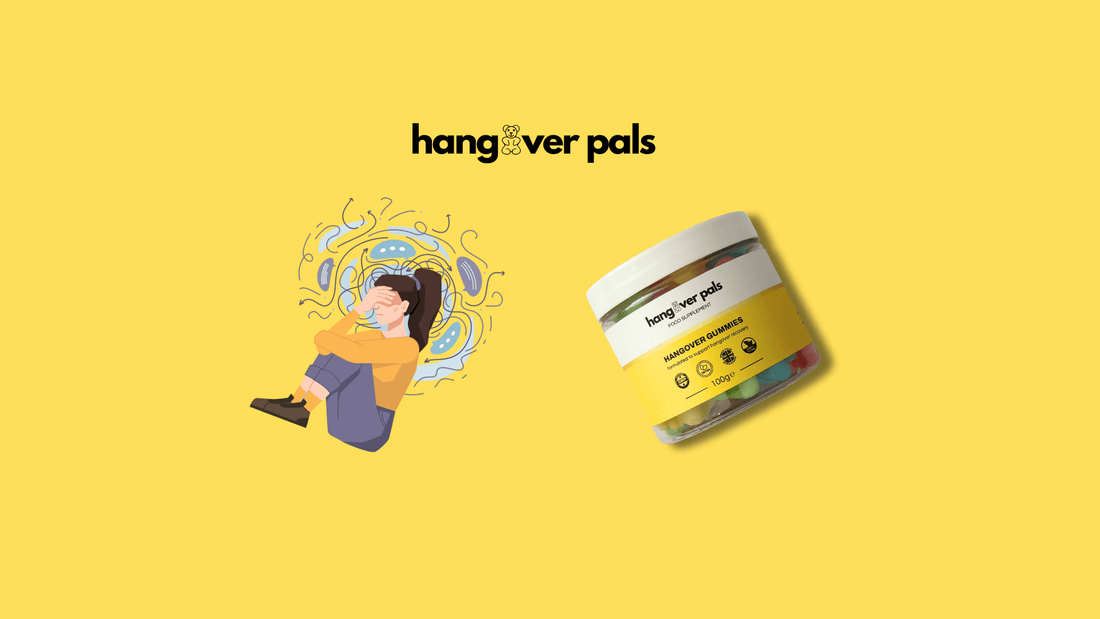
Hangover Anxiety (Hangxiety): Causes & How to Get Rid of It
Share
When you consume alcohol, it initiates a complex cascade of neurochemical changes that initially feel pleasant but can backfire dramatically the next day. At the heart of hangxiety lies alcohol's relationship with your brain's neurotransmitters—the chemical messengers that regulate everything from mood to cognition.
Alcohol primarily affects gamma-aminobutyric acid (GABA), your brain's main inhibitory neurotransmitter. GABA's job is to reduce neuronal excitability throughout your nervous system, essentially acting as your brain's natural tranquilizer. When alcohol enters your bloodstream, it enhances GABA activity, producing those familiar relaxing effects—reduced inhibitions, decreased anxiety, and a general sense of wellbeing.
Simultaneously, alcohol suppresses glutamate, an excitatory neurotransmitter that increases brain activity. This dual action—boosting the inhibitory while blocking the excitatory—creates the characteristic sedative effect of drinking.
However, your brain craves homeostasis. As alcohol levels rise, your brain compensates by reducing natural GABA production and increasing glutamate activity. This adaptation works temporarily while alcohol is present, but problems arise when you stop drinking and alcohol begins to leave your system.
During the hangover phase, you're left with artificially lowered GABA levels and heightened glutamate activity—essentially the opposite of alcohol's initial effects. This neurochemical rebound creates a state of hyperarousal and excitability in your brain, manifesting as anxiety, restlessness, irritability, and even panic.
Adding to this neurochemical storm, alcohol triggers the release of stress hormones like cortisol. While drinking, these effects are masked by alcohol's sedative properties. But as alcohol wears off, elevated cortisol levels persist, intensifying feelings of stress and anxiety.
Blood sugar fluctuations further complicate matters. Alcohol interferes with glucose regulation, often causing hypoglycemia (low blood sugar) during a hangover. Your brain interprets low blood sugar as a threat, triggering additional stress hormones that amplify anxiety symptoms.
Sleep disruption is another critical factor. While alcohol might help you fall asleep initially, it significantly reduces sleep quality by interrupting REM sleep—the restorative phase crucial for emotional regulation. This sleep deprivation further sensitizes the amygdala, your brain's fear center, making you more susceptible to anxiety the following day.
Understanding these neurobiological mechanisms helps explain why hangxiety isn't "just in your head"—it's a very real physiological response to alcohol's effects on your brain chemistry.
Common Symptoms of Hangxiety
The neurochemical imbalances triggered by alcohol consumption manifest in distinct ways that extend beyond the typical hangover experience. While a standard hangover might leave you with a headache and nausea, hangxiety introduces a psychological dimension that can feel equally if not more debilitating.
Many people experience a persistent sense of dread or impending doom that seems to hover over them throughout the day after drinking. This unspecified worry often lacks a clear source yet feels overwhelming. You might find yourself replaying conversations from the night before, wondering if you said something embarrassing or inappropriate—a phenomenon sometimes called "moral hangover."
Physical manifestations of hangxiety include a racing heart, shallow breathing, and trembling hands. These symptoms mirror those of panic attacks and can be particularly distressing if you've never experienced anxiety before. Excessive sweating, despite not being in a warm environment, commonly accompanies these sensations.
Heightened sensitivity to stimuli represents another hallmark of hangxiety. Ordinary sounds might seem jarring, lights too bright, and casual interactions unbearably intense. This sensory overload stems from your nervous system being in an artificially heightened state of alertness.
Concentration difficulties frequently plague those experiencing hangxiety. Even simple tasks may require tremendous mental effort as your brain, already dealing with chemical imbalances and possibly sleep deprivation, struggles to maintain focus. This mental fog can intensify feelings of inadequacy and worry.
Irritability often surfaces as well, with minor inconveniences triggering disproportionate emotional responses. You might snap at loved ones or feel overwhelmed by situations you'd normally handle with ease. This emotional reactivity reflects your brain's compromised ability to regulate emotions while recovering from alcohol's effects.
For those with pre-existing anxiety disorders, hangxiety can trigger more severe symptoms, potentially leading to full-blown panic attacks characterized by chest tightness, dizziness, and feelings of unreality or detachment from oneself.
Practical, Science-Backed Ways to Reduce Hangxiety
Recognizing these symptoms is the first step toward addressing hangxiety. Fortunately, several evidence-based approaches can help restore your brain's chemical balance and ease that post-drinking psychological distress.
Hydration stands as perhaps the most fundamental intervention. Alcohol is a potent diuretic that depletes your body of fluids and essential electrolytes like potassium, sodium, and magnesium—all crucial for proper neurological function. Begin rehydrating immediately upon waking with water, but consider adding electrolyte-rich options like coconut water or a low-sugar sports drink. These help restore electrical signalling in your nervous system, potentially calming overactive neural pathways contributing to anxiety.
Your nutritional choices can significantly impact hangxiety recovery. Focus on stabilizing blood sugar levels, as hypoglycemia mimics and exacerbates anxiety symptoms. Complex carbohydrates like oatmeal or whole-grain toast provide steady glucose release, while proteins help rebuild depleted neurotransmitters. Particularly beneficial are foods rich in B vitamins, which alcohol depletes extensively. Eggs, leafy greens, and legumes can help replenish these crucial nutrients that support neurological function and mood regulation.
Certain supplements show promise in easing hangxiety by addressing specific biochemical disruptions. Magnesium, often depleted by alcohol, helps regulate the nervous system and GABA production. L-theanine, an amino acid found in green tea, increases calming alpha brain waves and can counteract the excitatory state associated with hangxiety. B-complex vitamins support energy metabolism and neurotransmitter production, while NAC (N-acetylcysteine) may help neutralize alcohol's toxic metabolites and support liver function.
Movement therapy provides another powerful intervention. While intense exercise might feel impossible during a hangover, gentle movement stimulates endorphin release and accelerates toxin clearance. A brief walk outdoors combines the benefits of light exercise with nature exposure, which independently reduces anxiety. The natural light also helps reset disrupted circadian rhythms that contribute to mood disturbances.
Mindfulness practices directly counter the rumination and catastrophizing common with hangxiety. Deep breathing exercises—particularly the 4-7-8 technique (inhale for 4 counts, hold for 7, exhale for 8)—activate the parasympathetic nervous system, counteracting the stress response. Body scan meditations help bring awareness to physical tension without judgment, allowing you to release anxiety held in the body.
Sleep recovery deserves priority attention, as alcohol-disrupted sleep significantly worsens anxiety. If possible, allow yourself a short afternoon nap (20-30 minutes) to reduce sleep debt. Creating a cool, dark environment and limiting screen exposure helps your brain produce melatonin naturally. Some find that white noise or nature sounds mask the heightened sensory sensitivity that accompanies hangxiety.
Social connection, though often avoided during hangxiety, can provide powerful relief. Sharing your experience with an understanding friend activates oxytocin release, which naturally counters stress hormones. The tendency to isolate when anxious typically intensifies negative thought patterns, while brief social contact can interrupt the cycle of rumination.
How Hangover Pals Gummies Can Help Alleviate Hangxiety Symptoms
While implementing these lifestyle strategies provides substantial relief, targeted supplementation can address the specific neurochemical imbalances underlying hangxiety. Hangover Pals gummies offer a convenient, science-backed approach to this problem by combining key nutrients depleted during alcohol consumption.
The gummies' formulation targets multiple pathways involved in hangxiety development. Their B-vitamin complex, particularly B1, B6, and B12, supports proper neurotransmitter synthesis and function, helping to restore the GABA-glutamate balance disrupted by alcohol. This neurochemical rebalancing directly addresses the excitatory state that fuels anxiety symptoms the morning after drinking.
Electrolyte replenishment represents another crucial benefit of Hangover Pals. The carefully calibrated blend of magnesium, potassium, and sodium helps restore proper electrical signaling in your nervous system. Magnesium, in particular, acts as a natural relaxant by binding to and stimulating GABA receptors, essentially mimicking the calming effects alcohol initially provided without the subsequent rebound anxiety.
The gummies also contain natural anti-inflammatory compounds that help counteract alcohol-induced inflammation in both the digestive system and the brain. This systemic inflammation contributes significantly to both physical discomfort and mood disturbances during a hangover. By reducing neuroinflammation, Hangover Pals help restore normal brain function more quickly.
Antioxidants in the formula, including vitamin C and cysteine derivatives, support your liver's detoxification processes, helping to clear alcohol metabolites more efficiently. This accelerated clearance means less time spent with toxic compounds circulating in your bloodstream and affecting your brain chemistry.
Perhaps most appealing about Hangover Pals is their ease of use during a vulnerable time. When experiencing hangxiety, preparing complex remedies or remembering to take multiple supplements can feel overwhelming. The pleasant-tasting gummies provide a comprehensive solution in an accessible format, requiring minimal effort when your executive function is already compromised by alcohol's aftereffects.
Many users report that taking Hangover Pals before bed after drinking and again upon waking provides the most effective relief from hangxiety symptoms. This two-phase approach addresses both the immediate depletion effects and supports the recovery process during the critical morning hours when anxiety typically peaks.
Conclusion: Proactive Steps to Reduce Hangxiety
Understanding hangxiety as a physiological response rather than a personal failing marks an important shift in addressing this common experience. By recognizing the neurochemical basis of these symptoms, you can approach recovery with compassion for yourself and confidence in science-backed solutions.
The most effective approach to managing hangxiety combines preventive measures with responsive care. Before drinking, consider setting intentions about your alcohol consumption and preparing your environment with hydration supplies and Hangover Pals gummies within easy reach for your returning self. Alternating alcoholic beverages with water throughout the evening significantly reduces dehydration, while choosing drinks with fewer congeners (clear liquors versus dark) may result in less severe hangxiety.
If you find hangxiety consistently disrupting your life, it may be worth examining your relationship with alcohol more broadly. For some individuals, particularly those with underlying anxiety disorders, even moderate drinking can trigger disproportionate psychological aftereffects. This doesn't necessarily mean abstinence is required, but mindful moderation might improve your overall well-being.
Remember that hangxiety, while uncomfortable, is temporary. The neurochemical disruptions causing these feelings will normalize as your body processes alcohol and restores balance. During this window of vulnerability, be gentle with yourself. Postpone major decisions or difficult conversations, and recognize that your perception of situations may be temporarily distorted by your brain's chemical state.
By combining nutritional support through products like Hangover Pals with mindful drinking habits and compassionate self-care, you can significantly reduce both the frequency and intensity of hangxiety episodes. These strategies empower you to enjoy social occasions without sacrificing your mental well-being the following day.
